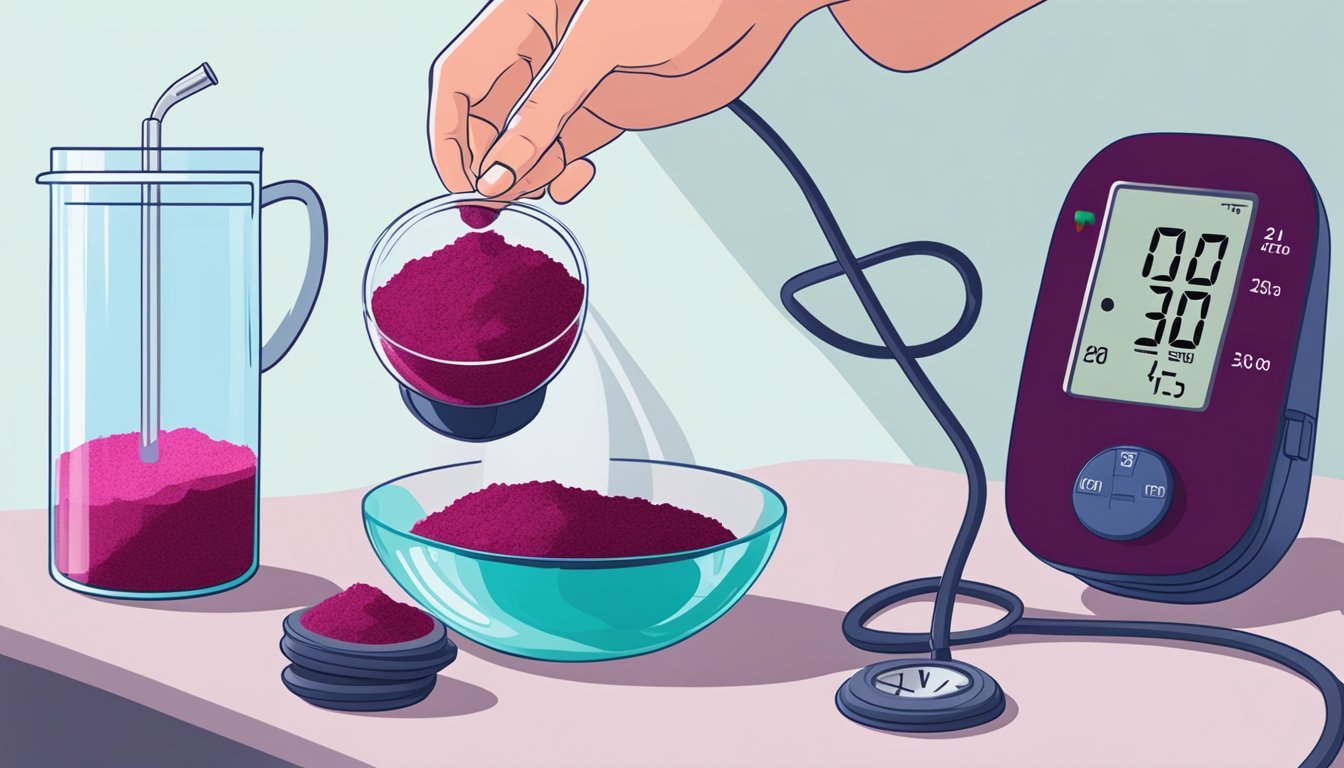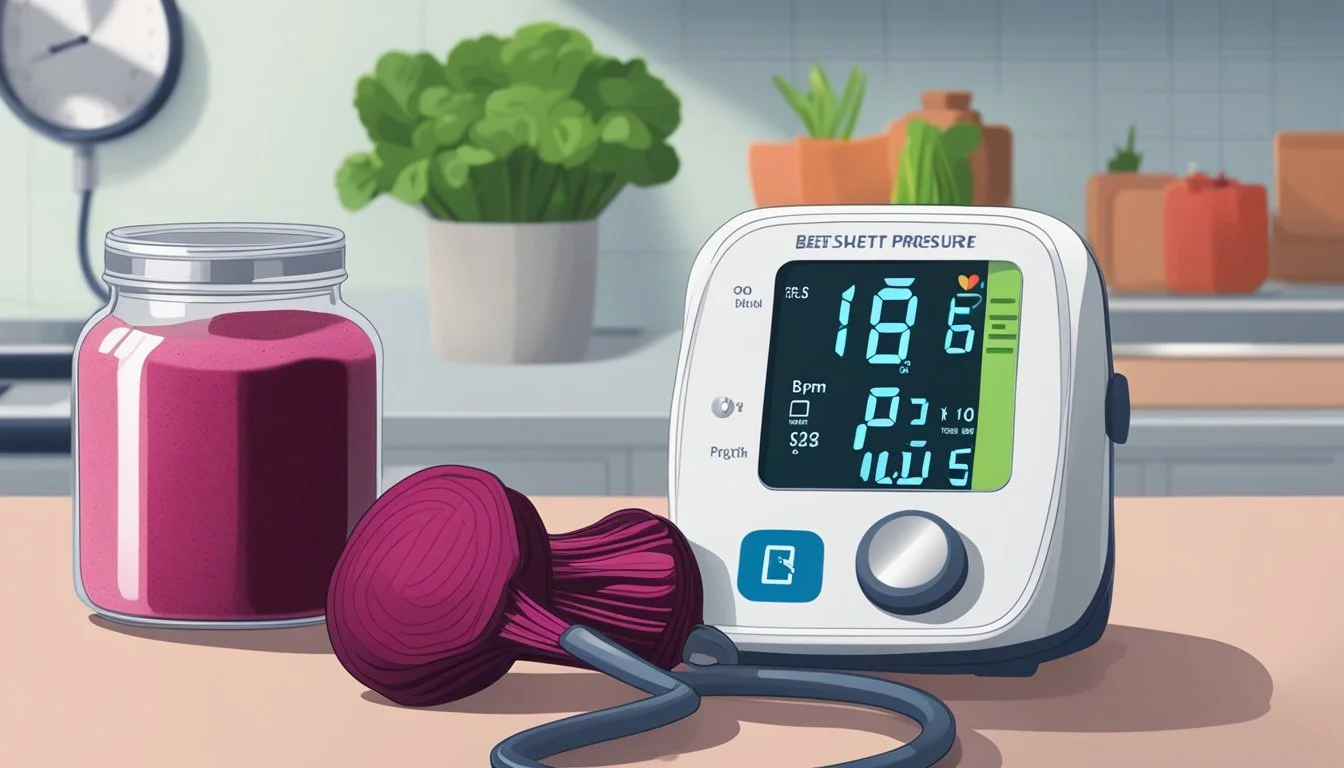Can Consuming Beet Powder Help Lower Blood Pressure?
Unpacking the Evidence
Beetroot and its derivative products, including beet powder, have been the focus of numerous health studies due to their potential benefits on cardiovascular health. The active compounds in beets, notably dietary nitrates, undergo a conversion process in the body, which ultimately leads to the production of nitric oxide. This compound is known to have vasodilatory effects, meaning it can help widen and relax blood vessels, thus potentially lowering blood pressure.
Many individuals with hypertension, or high blood pressure, are turning to natural remedies in conjunction with traditional treatments. Beet powder offers a convenient and concentrated form of the nutrients found in whole beets, and when mixed with water, it creates a nutritious juice. Initial research suggests that regular consumption of beet powder can contribute to modest reductions in blood pressure, although the extent of its effectiveness varies among individuals.
Incorporating beet powder into one's diet is simple, as it can be added to smoothies, water, or foods. It is packed with fiber, which supports digestive health, and its benefits extend beyond just lowering blood pressure. Increased blood flow, implied by regular consumption of beet-derived products, could also enhance brain function and overall vascular health. It's important for consumers to consider beet powder as part of a balanced diet and a healthy lifestyle, rather than a singular solution to blood pressure concerns.
Understanding Blood Pressure and Beet Powder
This section explores blood pressure's basics and the evidence supporting beet powder as an agent that may assist in lowering blood pressure.
What Is Blood Pressure?
Blood pressure is the force exerted by circulating blood on the walls of blood vessels. It's measured in millimeters of mercury (mm Hg) and recorded as two figures:
Systolic pressure: the pressure when the heart is pumping
Diastolic pressure: the pressure when the heart is at rest between beats
Normal blood pressure is typically around 120/80 mm Hg. Consistently elevated levels may indicate hypertension.
The Role of Beet Powder in Lowering Blood Pressure
Beet powder derives from dehydrated beets and retains the natural compounds found in the raw vegetable. It contains dietary nitrates that convert to nitric oxide in the body. Nitric oxide has a dilating effect on blood vessels, which can help in reducing blood pressure. Studies have documented that consuming beet powder can lead to modest reductions in blood pressure due to this effect.
Nutritional Profile of Beet Powder
Beet powder is a concentrated form of beets, retaining the root vegetable's nutrients in a versatile, easy-to-use product. This form maintains many of the beneficial components that one might find in fresh beets.
Key Nutrients in Beet Powder
Beet powder contains a wealth of vitamins, minerals, and bioactive compounds. It is particularly noted for its high levels of fiber, which supports digestive health, and potassium, which is essential for heart function and muscle contraction. Moreover, beet powder is a good source of magnesium, a mineral vital for many body processes, including nerve function and blood sugar control.
When discussing caloric content, beet powder is relatively low in calories, making it a nutrient-dense option for those monitoring their calorie intake. While beetroot naturally contains sugar, the dehydration process often reduces the amount found in the powder form.
As for micronutrients, beet powder offers a range of vitamins, including B-vitamins, which play a key role in energy metabolism. The mineral profile boasts significant amounts of essential minerals such as iron, important for blood health, and calcium, necessary for bone strength.
On the macronutrient side, beet powder provides carbohydrates, including the fiber mentioned earlier, and a moderate amount of protein, adding to its nutritional value. It should also be noted that, as beet powder comes from a plant source, the iron present is non-heme iron, which is better absorbed when consumed with a source of vitamin C.
It's clear that beet powder is rich in nutrients that play a crucial role in maintaining good health, making it a substantial addition to a balanced diet.
How Beet Powder Affects Blood Pressure
Consumption of beet powder may play a significant role in regulating blood pressure, primarily due to its high nitrate content which the body converts into nitric oxide, a compound that facilitates vasodilation and improved blood flow.
Nitric Oxide Production
Beet powder is rich in dietary nitrates. These nitrates are converted by the body into nitric oxide, a molecule that is crucial for various bodily functions. Nitric oxide is produced naturally within the body and serves as a signaling molecule that helps to regulate blood flow and pressure. When beet nitrates are consumed, they are converted to nitric oxide, which can lead to a reduction in both systolic and diastolic blood pressure readings.
Vasodilation and Improved Blood Flow
The production of nitric oxide from beet-derived nitrates leads to vasodilation, which is the widening of blood vessels. This process reduces the resistance within the blood vessels, allowing blood to flow more freely. As a result, there's less strain on the cardiovascular system, leading to potential improvements in blood flow and a decrease in blood pressure. Studies have suggested that the consumption of beet juice or beetroot juice can have a noticeable effect on blood pressure levels, especially in individuals with high blood pressure.
Scientific Evidence on Beet Powder and Blood Pressure
Recent studies have suggested a link between beet powder, which is rich in nitrates, and the management of blood pressure. The nitrates found in beet powder are critical to this effect, thanks to their conversion into nitric oxide, which can help dilate blood vessels and thereby reduce blood pressure.
Clinical Studies and Meta-Analysis
Clinical studies on beet powder and its influence on blood pressure present interesting findings. In a controlled setting, beet powder has been shown to have a blood pressure-lowering effect. This is attributed to its high nitrate content, which is converted to nitric oxide in the body, aiding in vascular relaxation and subsequently lowering blood pressure.
A meta-analysis, which compiles and reviews data from multiple studies, provides further scientific evidence regarding the efficacy of beet powder in managing hypertension. In this comprehensive review, data indicates a consensus that daily supplementation with beetroot, in juice or powder form, often results in a decrease in systolic blood pressure. These findings suggest that the inclusion of nitrate-rich beet powder in the diet may offer a non-pharmacological strategy for people with elevated blood pressure levels.
While the majority of the research focuses on beet juice, the powdered form of beets is also studied due to its similar nitrate composition. Although less research exists specifically for beet powder, the studies that do include it typically mirror the results found with beet juice, indicating a beneficial role in blood pressure management. It's crucial to note that the extent and duration of these blood pressure reductions can be variable, and continuous use of beet powder may be necessary to maintain the effects.
Additional Health Benefits of Beet Powder
Aside from its potential to lower blood pressure, beet powder offers a host of other health benefits. These include powerful antioxidant effects, anti-inflammatory properties, enhanced athletic performance, and contributions to overall heart health.
Antioxidant Properties
Beet powder is rich in betalains, compounds that exhibit antioxidant capabilities. Antioxidants are crucial for neutralizing harmful free radicals within the body, which can prevent cellular damage linked to aging and diseases, including cancer.
Inflammation Reduction
The anti-inflammatory benefits of beet powder are linked to its betalain content. Chronic inflammation is known to contribute to obesity and other health issues, and consuming beet powder can help reduce this inflammation, supporting overall health.
Exercise and Athletic Performance
Beet powder may enhance exercise and athletic performance by improving endurance and muscle efficiency. It does so by increasing nitric oxide levels, resulting in improved oxygen flow and energy levels, beneficial for athletes or those with active lifestyles.
Heart Health
The nutrients in beet powder support heart health by assisting in the management of LDL cholesterol levels and promoting healthy blood flow. Additionally, its high fiber content can help combat obesity, a known risk factor for heart disease.
Incorporating Beet Powder into the Diet
Beet powder can be a versatile addition to one's diet, enhancing nutritional intake with dietary nitrates that are linked to blood pressure regulation. This section offers guidance on effective ways to add beet powder to various dishes and appropriate consumption levels.
Recommended Methods and Recipes
One can easily incorporate beet powder into the diet by integrating it into smoothies for a nutritious start to the day or as a post-exercise recovery drink. The powder contributes an earthy flavor and is packed with nutrition. Oatmeal also pairs well with beet powder, adding both color and nutrients to a breakfast staple.
Sauces and dressings can benefit from a sprinkle of beet powder, boosting the nutritional profile without dramatically altering the taste. For a creative twist, some individuals add beet powder to pizza dough, enhancing the food's visual appeal and nutritional value.
Below are two simple recipes showcasing beet powder:
Beetroot Smoothie: Blend together 1 banana, 1/2 cup of frozen berries, 1 tablespoon of beet powder, 1 cup of almond milk, and a handful of spinach.
Beet-Infused Oatmeal: Cook your regular oatmeal and stir in 1 teaspoon of beet powder, a drizzle of honey, and a sprinkle of cinnamon for an energizing breakfast.
Dosage and Frequency of Intake
It's essential not to consume excessive quantities of beet powder. Start with a small dosage, such as one teaspoon per day, and monitor how your body reacts. Gradually, one may increase the amount, but typically not exceeding two tablespoons per day as part of a balanced diet. Regular consumption can assist with the intake of dietary nitrates, which are instrumental in supporting blood pressure regulation, but one should always adhere to the recommended daily amounts and consult with a healthcare provider regarding any dietary changes.
Risk Factors and Considerations
Consuming beet powder may offer benefits for blood pressure management, but it's crucial to consider potential risks and interactions. Individuals should consult a healthcare professional, especially if they have pre-existing health conditions or are taking medications.
Possible Side Effects
Beet powder consumption can lead to side effects in some individuals. One notable concern is the effect of high oxalate levels, which beets contain, on the kidneys. Oxalates can contribute to the formation of kidney stones in susceptible individuals. It is important for individuals with a history of kidney stones to moderate their intake of high-oxalate foods or supplements. Additionally, changes in urine or stool color may occur, which, while harmless, can be alarming for some individuals.
Interactions with Medications
Interactions with medications are important considerations when adding beet powder to one's diet. Specifically, beet powder can influence blood pressure and may interact with blood pressure medications, potentially leading to hypotension, or abnormally low blood pressure.
Blood Pressure Medications: Individuals taking any medications that affect blood pressure should consult a doctor to avoid any potential additive effects that could cause blood pressure to dip too low.
Blood Sugar Medications: As beet powder might affect blood sugar levels, those on diabetes medications should also monitor their blood sugar closely.
Furthermore, as grapefruit juice can interfere with the efficacy of certain blood pressure medications, individuals consuming beet powder in conjunction with a variety of juices should discuss this combination with a healthcare professional. It is also recommended that any concerns about liver health or nutrient-specific conditions be reviewed with a doctor, as these factors may influence the suitability of beet powder in a diet.
Consulting Healthcare Professionals
Before introducing beet powder or any supplement into one’s diet for managing high blood pressure, it is crucial to consult a healthcare professional. They can provide individualized advice, ensuring that new supplements complement existing medications and health plans.
When to Consult a Doctor
If an individual is diagnosed with high blood pressure or hypertension, they should speak with their doctor about all potential treatment options. Beet powder's potential to lower blood pressure could interact with prescribed medications, necessitating a healthcare professional's guidance. Those observing changes in their blood pressure after consuming beet powder should also seek medical advice to interpret these changes correctly.
Upon Diagnosis: A healthcare professional should be consulted immediately after a hypertension diagnosis to discuss all viable treatment measures, including dietary supplements.
Before Starting Supplements: Prior to taking beet powder, consult a doctor to determine its appropriateness and avoid any adverse interactions with existing medications.
Monitoring Changes: Regular check-ins with a healthcare professional are advised to monitor the effects of beet powder on one's blood pressure.
It is noteworthy that while many individuals may manage their blood pressure successfully with lifestyle changes and supplements, others may require medication. Only a doctor or healthcare professional can provide the necessary advice to manage high blood pressure safely and effectively.





